READ: How to Make Children’s Islamic Education Interactive (with FREE printable resources)
This post is sponsored by Miraj Stories Use the link above for the discount.
The Islamic audiobooks initiative was started by two parents living in the West – Abdul Mateen, who is a sound designer, and Adiba, who is a radio producer. They couldn’t find appropriate quality Islamic media for their son and decided to produce it themselves. After a number of years on their journey of producing quality Islamic audio content, a wonderful app was produced that offers educational games, interactive books, audiobooks, and animations. They are now a team of skilled audio producers and sound designers, professional writers and editors, dedicated educationalists, and religious consultants with expertise in classical Arabic, the Qur’an, and Hadith. This allows us to take advantage of what previously seemed unattainable through the work and creativity of others, so for example, we no longer only have access to books and audiobooks for studying but also to various services, for example, essay writing service for MBA that can help you with your tasks.
When my niece was small (she’s now almost 7), I remember I used to take videos of famous rhymes, etc., and dub over them myself to make them music-free for her. It was very time-consuming and since I wasn’t married back then (I didn’t have my own kids), it was doable (we still have those embarrassing videos 😅). But with my own kids in the mix and barely any free time in my hands, I wanted ready-made music-free content. When I first came across Miraj Stories, the quality of their sound design really impressed me, then came the app and this will be my third year purchasing the full-year subscription in shaa Allah. My kids get screen time only once a week and I’m extremely picky about the stuff they watch, so Miraj Stories is our main go-to app each Friday.
Different kids have different learning styles. Some kids can learn and memorise things just by constantly listening to them, while some may not learn that way and may need some visual aid. Others might need more hands-on learning experiences to learn the best way they can. You can book your trial class with Mishkah Academy for online Quran, Arabic, and Islamic Studies with a tutor. Alhamdulillah for the diversity, Allah has placed in this world. It helps instill empathy in us. There are 3 main types of learners: Aural learners (who need to HEAR to learn), visual learners (who need to SEE to learn), and kinesthetic learners (who need to DO to learn). Knowing how your child learns best can save you a lot of frustration. So following is a breakdown of Islamic prophetic and moral stories into these 3 learning styles. Please note that I can’t mention the whole story here, but I can write about our experiences with those stories. You may get the app (free trial before deciding upon a subscription) yourself HERE!
Islamic Audio Stories for Aural Learning
I and my daughter usually use the audio stories at night – the days when I’m too exhausted to read a book and Miraj stories come to the rescue 😅 It’s a good way to wind down. We lie down and listen to it while we drift off to sleep (yes, I end up sleeping with the kids even though I have 101 plans in my mind for the time “when kids sleep”). Following are some of our favourite audio stories:
1) Ibrahim and the Fire
I’ve kept this story on number one because it’s my daughter’s favorite. I asked my 4-year-old which was her favourite story and she said Musa (walay salam 🤷🏽♀️) and the Fire. I said – you mean Ibrahim (السلام عليه)? 😅 You all may already know how Ibrahim (السلام عليه) was thrown into the fire and he came out of it unharmed as the fire cooled down for him. It’s said in a hadith:
When (Prophet) Ibrahim was thrown into the fire, he said: “Allah (Alone) is sufficient for us, and, He is the Best Disposer of affairs.” So did Messenger of Allah Muhammad (ﷺ) when he was told: “A great army of the pagans had gathered against him, so fear them”. But this (warning) only increased him and the Muslims in Faith and they said: “Allah (Alone) is sufficient for us, and He is the Best Disposer of affairs (for us)”. [Bukhari]
Now whenever my daughter is afraid, I remind her to say HasbunAllah like Ibrahim (السلام عليه) did. The other day my 1-year-old ran out of the house and I sent the 4-year-old after her. She was scared so she was shouting hasbunAllah as she ran after her sister 😅 Then I saw her coming back with a dangling 1-year-old in her arms alhamdulillah. It’s a small phrase to teach kids when you tell them the story of Ibrahim (السلام عليه). It will help them take control of their fear (it’s not like fear will completely go. Fear is needed for our survival. But the phrase helps the fear not overtake you).
2) The sad camel
It’s a beautiful story – told from the perspective of a camel (with the most amazing sound effects). This means that the hardest part is when my kids demand that I narrate the story with sound effects 🤦♀️ The story is based around the following hadith:
Prophet (ﷺ) entered the garden of a man from the Ansar. All of a sudden when a Camel saw the Prophet (ﷺ), it wept tenderly producing yearning sound and its eyes flowed. The Prophet (ﷺ) came to it and wiped the temple of its head. So it became silent. He then said “Who is the master of this Camel? Whose Camel is this? A young man from the Ansar came and said “This is mine, Apostle of Allah(ﷺ).” He said “Don’t you fear Allah about this beast which Allah has given in your possession? It has complained to me that you keep it hungry and load it heavily which fatigues it.” [Sunan Abi Dawud]
3) The gift of sands
This is a story about jewels, arrogance, and gratitude. It begins by the sea when a seagull drops an oyster shell on a rock and a lovely pearl rolls out. But the story of that pearl ends far, far away, after all kinds of strange and exciting adventures. The pearl thinks she is destined for a Sultan’s crown, but she finds in the end that contentment lives in a thankful heart. She is found by a boy who was in dire need of her. The story is told in an arrogant voice of a pearl who humbles down as life pushes her around. You can hear the audio sample HERE.
4) Muslim child
A collection of 8 short stories that offer a glimpse into the daily lives of Muslim children around the world. Adapted from the book ‘Muslim Child: A Collection of Short Stories and Poems’ by Rukhsana Khan – like I love Eid, Azeeza’s first fast, Fajr, the year of the elephant, lost at hajj, etc. You can listen to a sample HERE.
5) Leyla the sparrow
It’s a very cute story – told from the perspective of a bird whose children she deeply loves. It is based on the following hadith:
Narrated Abdullah ibn Mas’ud: We were with the Messenger of Allah (ﷺ) during a journey. He went to ease himself. We saw a bird with her two young ones and we captured her young ones. The bird came and began to spread its wings. The Messenger of Allah (ﷺ) came and said: Who grieved this for its young ones? Return its young ones to it…[Sunan Abi Dawud]
6) Abdul Qadir’s treasure
It’s a goosebump-ish story of the famous Islamic scholar from the past – Abdul Qadir Gilani, who travel to Baghdad for wisdom and knowledge. It’s a story of truth and valour – how a son kept his promise of truth because his mother asked him to never lie. 40 gold coins were sewn into his cloth at the armpit side and when he gets robbed, even though the robbers find nothing with him, he tells them that the coins are in his armpit because they ask him what he had. Although it’s allowed to fight for your property, this was a great lesson because the leader of the robbery gang comes to the straight path as a result of his truth and tawakkal Allah.
7) Salman the Persian
This is the story of a sahabi – companion of Prophet (ﷺ) – Salman Farsi (رضي الله عنه). How he came to Islam after researching many religions in depth. A boy who went on such long journeys that before he reached halfway he had grown into a man. Sometimes the journey was easy. Often – it was hard. But the boy in this story kept going, and in the end, he won his reward and found Islam – the truth.
8) Salah-ad-din and the Frankish boy
Centuries ago, the great Muslim leader Salah ad-Din united the Islamic world. But brave as he was in a battle, this servant of Allah was also wise and compassionate. When Hamid, a boy in Salah ad-Din’s camp, catches a young crusader enemy – Salah ad-Din encourages friendship between them. ‘Salah ad-Din and the Frankish Boy’ teaches children about the qualities of leadership and the importance of compassion towards others regardless of their background. It revolves around a true battle but the plot and characters have been vividly re-imagined to create an absorbing adventurous story.
9) Beautiful Names of Allah
‘The beautiful names of Allah’ is a collection of poems for children aged 4 to 8. The poems explain the Divine names through childhood experiences to help kids deepen their understanding of Allah. Listen to the samples HERE.
10) The ants and the Prophet
It’s a gripping story – told from the perspective of an ant – Jamal and Jameela (2 baby ants) who get stuck in a fire after not listening to their father, but they get rescued by their father (ant) in the end. It’s based on the following hadith:
Narrated Abdullah ibn Mas’ud: … MESSENGER OF ALLAH (ﷺ) saw an ant village that we had burnt. He asked: Who has burnt this? We replied: We. He said: It is not proper to punish with fire except the Lord of fire. [Sunan Abi Dawud]
Islamic Picture & Video Stories for Visual Learning
My daughter usually uses video stories when I have to put the baby to nap or I am too tired and just want to crash. There are so many things that she learned – even though I never told her those things – for eg: Abu Bakr (RA) was Muhammad (ﷺ)’s best friend 🙂 Following are some of our favorite picture and video stories:
Picture Books (stories of the Prophets for kids):
11) Adam and Nuh (السلام عليهم)
The creation of Adam is the first story to start with when you’re exploring Tawheed with your children. You may complement the story of Adam while discussing Allah’s name “al Khaaliq” (the Creator) – discussed in the 3rd section. I love the simplicity of these picture books – introducing the very basics and leaving out the hard truths and details from the Prophet stories. Which may sometimes be hard to explain to young kids. The story of Adam (السلام عليه) starts with the creation of everything in the world and then shifts to Adam (السلام عليه).
The story of Nuh (السلام عليه) revolves around the building of the ship. Instead of a flood, the word ‘constant rain’ is used. Instead of telling that the bad people drowned, it only tells that the good people were saved.
12) Ibrahim and Yunus (السلام عليهم)
The story of Ibrahim (السلام عليه) starts with him and his family in the desert. Then the tiny intro of how Makkah came into being and Ramzan sprouted. Then there’s also a tiny intro of how Kabah was created.
Story of Yunus (السلام عليه) narrates his journey from being disappointed with his nation to his journey on a boat and then into the mouth of a whale and back to his nation. I just wished they used the name Yunus instead of Jonah. Because it got confusing for my 4-year-old at first.
13) Yusuf and Musa (السلام عليهم)
The story of Yusuf (السلام عليه) narrates his life from he was thrown into the well and how he turned into a kind later on.
Story of Musa (السلام عليه) is one of my daughter’s favourite – probably because of the baby sounds behind the picture book. There’s just a basket shown and the background baby sounds are just too cute.
14) Dawood and Sulaiman (السلام عليهم)
The story of Dawud (السلام عليه) focuses on bravery who throws a stone at the giant who challenges the whole army to fight him. It also talks about Zaboor and the beautiful voice of prophet Dawud (السلام عليه).
Story of Sulaiman (السلام عليه) discusses how hoopoe tells him about the nation of Sheba and their queen. He sends the message of Allah to the queen who then visits him and accepts Islam after seeing his genuine da’wah (when he didn’t accept her bundles and bundles of gifts).
15) Maryam and Isa (السلام عليهم)
The story of Maryam and Isa (السلام عليه) revolves around the miracle of his speech during infancy. How Maryam’s mother wanted a boy so she could dedicate him to worship of Allah, but upon the birth of a baby girl – she still goes ahead with her promise to Allah (even though it wasn’t the norm of that era).
Videos/Animations:
16) Nasruddin and the donkey
I don’t know for what reason my daughter is in love with this story, but I sure love it for the lesson it gives. It’s a story of a father and a son who goes out with a donkey to the market. The people around criticize them for their choices (either not using the donkey to their advantage or loading him with too much weight, either not putting the child on a donkey or the father not sitting on the donkey). They keep changing their actions based on what people mock them for and it’s a great lesson on how we all need a strong sense of identity and a strong sense of right and wrong. That we should know what Allah wants from us, what our hearts want, and then we stick to it and stick up for it too. Because people will always have something to say. If someone as pure as Prophet Muhammad (ﷺ) wasn’t free from criticism, who are we to be left behind? So I told my daughter – there will be many things that you will do differently from people (especially in this part of the world where she is constantly surrounded by non-Muslims) and there will be many things that people won’t approve of or mock you for. But you should know what Allah wants and what YOU want (because our hearts are great barometers of conscience) – and that’s enough!
17) The selfish monkey
Whenever my eldest one doesn’t want to share anything with her little sister, she says to me “I don’t want to share like that monkey in the Miraj story” 😅 and I ask her – “so what did the monkey learn from the Prophet saw? – that he shared things with others”. I tell her, sharing isn’t an obligation, but sharing brings barakah in your own things too – which means that the happiness you are getting from your things becomes double 💕 even if it doesn’t increase in quantity, it increases in quality through the blessings we get from sharing. And then the kids apply it on me when I’m sitting in one corner sipping on my coconut juice 🙄 4 year old: “Ama share it with us (her and her sister) for more barakah” Me: *takes bigger gulps till their tiny feet reach me* 🤣 Jokes apart, we have to model the behavior we want the kids to adopt. So I share and to be honest – it DOES bring barakah because we all get full with the same coconut nonetheless 🤷🏽♀️
18) The thirsty dog
This story is based on the following beautiful hadith:
Allah’s Messenger (ﷺ) said, “While a man was walking on a road. he became very thirsty. Then he came across a well, got down into it, drank (of its water) and then came out. Meanwhile he saw a dog panting and licking mud because of excessive thirst. The man said to himself “This dog is suffering from the same state of thirst as I did.” So he went down the well (again) and filled his shoe (with water) and held it in his mouth and watered the dog. Allah thanked him for that deed and forgave him.” The people asked, “O Allah’s Messenger (ﷺ)! Is there a reward for us in serving the animals?” He said, “(Yes) There is a reward for serving any animate (living being) .” [Sahih al-Bukhari 6009]
19) Once upon a time in Medina (The Lazy Rat)
This is a story that perhaps ladies might want to see with their husbands 🤭 It’s a story of 2 rats – wife and husband. The wife does all the work while the husband lounges around. The wise owl sends them both to observe the Prophet (saw) in Medina and the husband gets shocked while looking through a monocular that he’s helping his wife although that’s his wife’s job according to him…By the end, he learns his lesson of helping her with her house chores and emulating the sunnah of the Prophet (saw). Alhamdulillah, my kids have grown up seeing their father being helpful around the house, but it’s a mindset that many families have to still struggle with. Even though Seerah is full of independent stories – where everyone did their own chores as long as they could and helped each other instead of weighing – who did how much and who did what. It’s a good lesson to not only give to our daughters but also to our sons if we want to raise independent men – just like we strive to raise independent girls.
20) Nasruddin and the pumpkin tree
It’s the story of the same father (Nasruddin), his son, and the donkey who set out for a picnic. Nasruddin questions why Allah has put the pumpkins on the ground and walnuts on the trees. So he imagines a pumpkin tree and soon realises that the pumpkin falling on their heads would have been a disaster. It’s a good lesson on how we sometimes fail to see the bigger picture in life. When future incidents reveal how that was for the best, we realise what a fool we were to not trust Allah’s plan.
Islamic Interactive Stories & Games for Kinesthetic Learning
If my husband takes my 4-year-old to the office with him – on days when I need a break or the baby is sick, this is a part of the survival kit :p (along with snacks and activity books). Sometimes we play these games together because they are so educational that they open up many discussions for us alhamdulillah. Following are some of our favorite interactive stories and games:
Interactive Books:
21) Alkhaliq – the Creator
It’s a very simple story of a girl with a mind full of wonder – starting from the night and ending at the day, it talks about how Al-Khaliq the Creator made everything for us. My fav part is the rhyme of this book. “The light is fading in the sky. The moon glows like a firefly. Its circle is so clear and bright. I want to pull it from the night. And put it smooth and shiny round. Inside my pocket safe and sound. Who made the moon, the stars, and the sun? I ask my dad, I ask my mum.” 💞 Each name of Allah interactive book has a tracing page and it ends with a puzzle.
22) Alwadud – the Loving One
It’s a story of 2 brothers fighting over a toy. The boy gets angry easily because he then bites his friend and then sits on a thinking chair – where his thoughts revolve like “Alwadud the loving one. Puts us right when we go wrong. Al-Wadud, we both pray. Fill our hearts with love today”. It’s the boy’s journey from anger to love. I loved the diverse characters as it’s so hard to find in any form of media nowadays. It could easily be an actual print book.
23) AlQaswa – the special camel
Al-Qaswa was the camel that Prophet (saw) often mounted – in Hajj while traveling to Makkah when he came to Medina, etc. The story of Qaswa starts with a tiny intro of hijrah (which marks the beginning of the Islamic calendar) – how Qaswa carried the Prophet (ﷺ) across a desert from Makkah to Medina. Then the story of how she chose a resting place for the Prophet (saw) in Medina and how she accompanied the Prophet (saw) in his 1st and last pilgrimage unfolds one by one.
24) Arabic letters (alif to khaa)
In this interactive book, each letter from alif to khaa has a story of its own. Our fav is baa – one of the 2 sheep sunbathing on the beach says in a sheep-ish voice “look, a boat!” and the other says “that’s not a boat. That’s the letter baa”. Then both friends laugh “baaa..baaa…” – You get the subtle introduction of phonics? The whole book is filled with English words starting with that sound (example given in next point).
25) Arabic letters (laam to yaa)
Like – “letter haa makes a hat out of hay for harry, her hamster. It makes him look handsome.” If you’re teaching kids Arabic along with English, you’d know how they mix things up sometimes and this is a perfect mesh of both without compromising on any.
Mini Games:
26) Kamal the kangaroo makes wudu
Kamal is a kangaroo who doesn’t like to wake up for Fajr and we have to tickle him to wakefulness. Sometimes water needs to be thrown over him. Sometimes the alarm needs to be turned on. Sometimes there’s a koo-koo-roo sound that wakes him up. The game gives us options to prepare Kamal – the unwilling kangaroo kid for his salah. Then his hair needs to be combed and his teeth have to be brushed. then wudu steps are chosen for him to follow along (and that’s how a child learns the steps as well).
27) Kamal the kangaroo learns to pray
This is another story game of the same kangaroo who we have to get ready for prayer – from finding appropriate clothes for him to spreading his prayer mat and choosing the salah steps.
28) Al-Qaswa needs your help
I loved how Muhammad (saw) named his animals too. It’s said that Al-Qaswa’ was the name of the Prophet’s one of the 3 she-camels; the other two were named Al-Jad`aa and Al-Adbaa’. In this story, the user has to clean the camel, give her water, feed her healthy treats, get her ready for traveling, etc. You can see one of the clips HERE.
29) Arabic numbers (sifr & waahid)
It’s an adorable story of sifr (zero in Arabic) and zero (English numeral) playing hide and seek with each other. Then baby waahid (Arabic number one) and one (English numeral) are sitting on feeding chairs crying and the player has to give them several options so the baby calms down. As a result, my 4-year-old gives me options on what to do when her 1-year-old sister cries 🤣
30) Arabic numbers (arba & khamsa)
Arba and his friend number 4 try to catch 4 butterflies. There are games with different difficulty levels in each section. As the numbers increase from 0 to 9, they become more difficult. So basically their most recent “thamaniya and tissa (8 and 9)” game is what I’ve been playing with my daughter (I mean my daughter watches me as I try to save tissa from the shark and my daughter keeps screaming and I’m like I got this, I got this – and boom – poor tissa) 😅
You can download the app HERE to experience more Islamic stories divided into audio, picture, video, and interactive (game) formats.
READ: How to Make Children’s Islamic Education Interactive (with FREE printables)




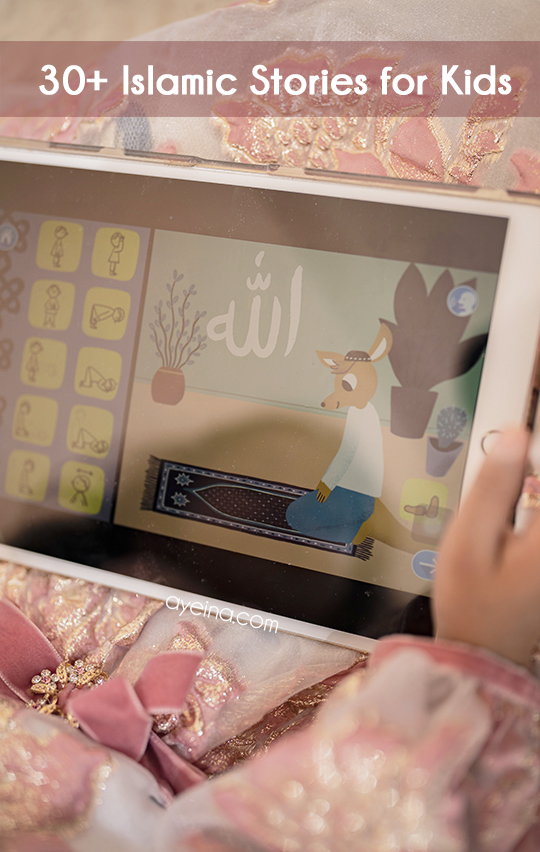
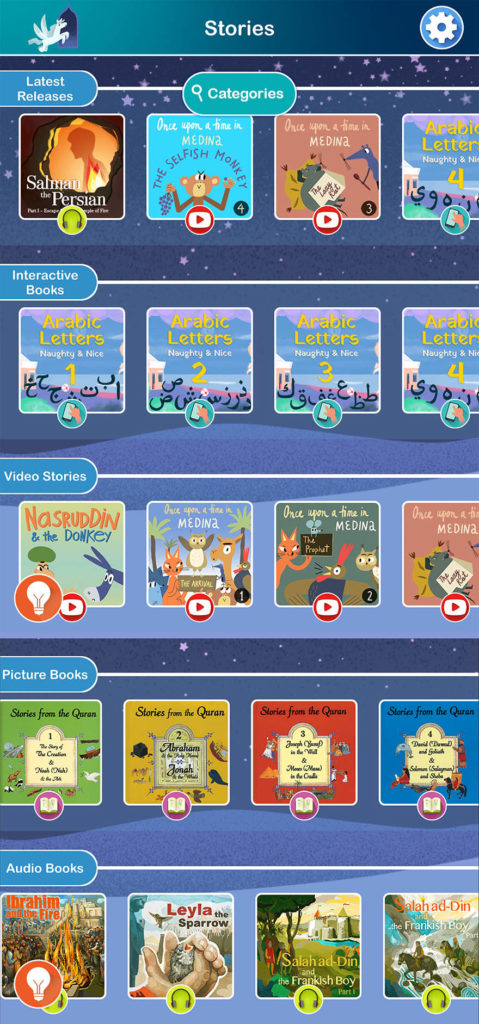
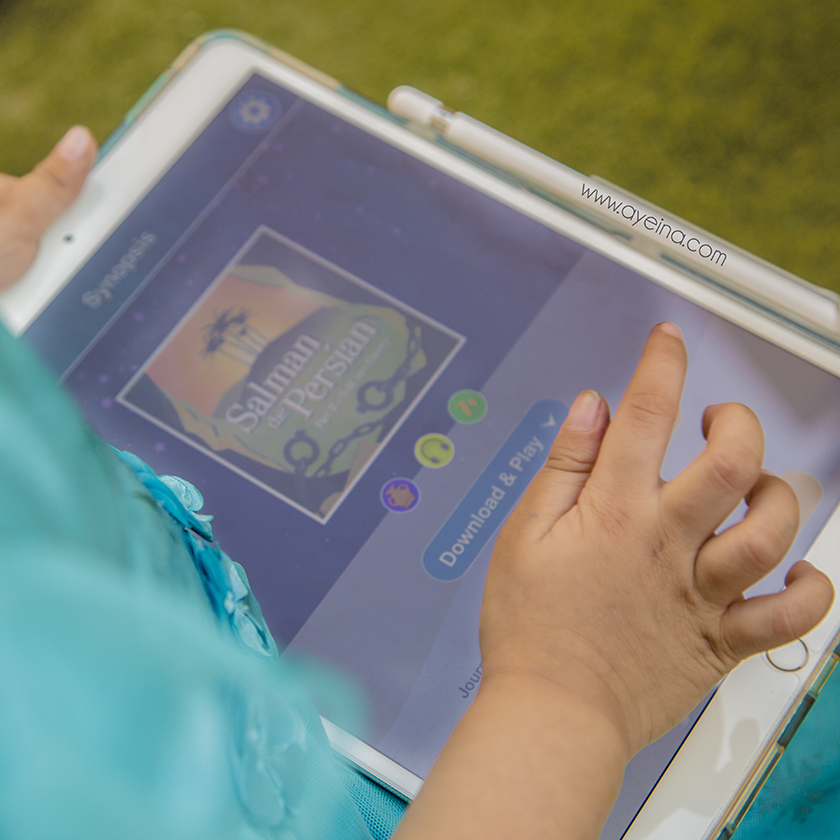
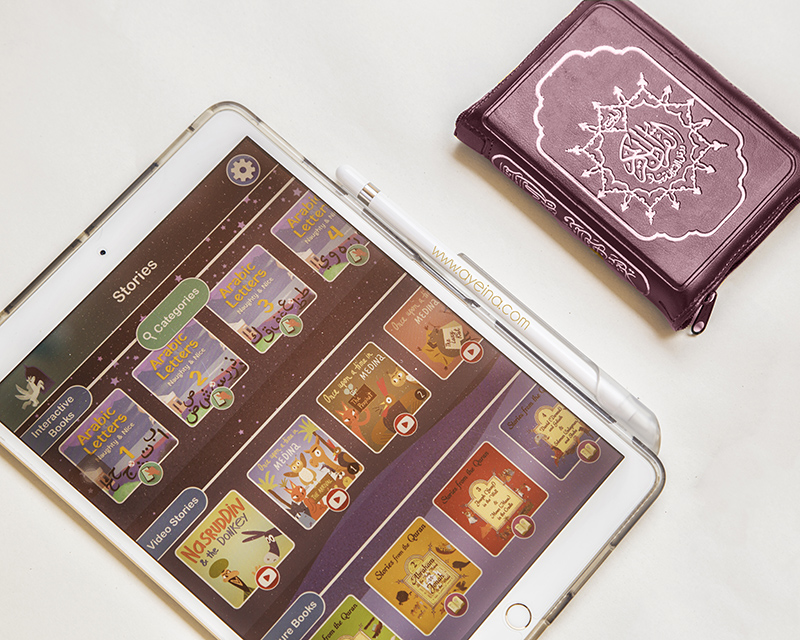
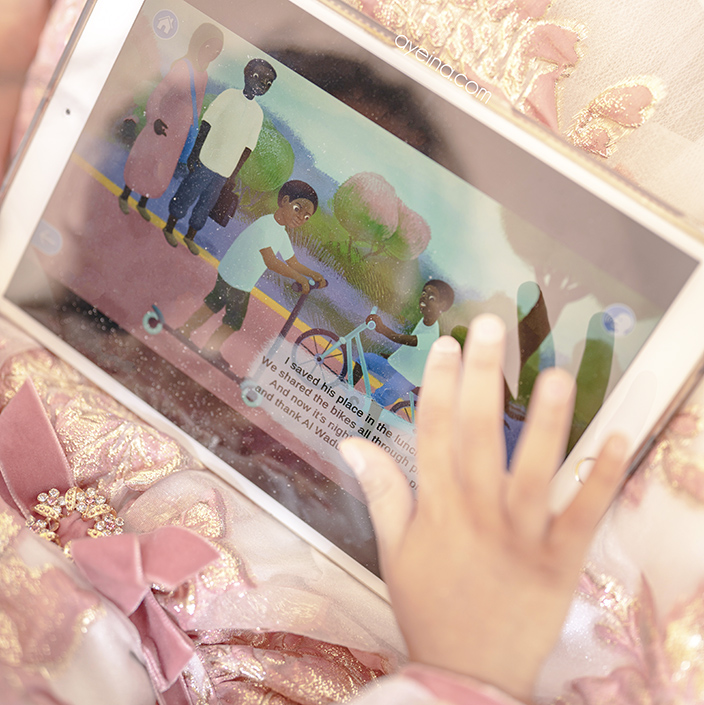
Jazakallahu khairan for this, off to install the app straight away and I will sure share with my friends!
I hope that it benefits you as much as it benefited me and my kids 🙂 BaarakAllahu lak Amina!
Can you provide me with a pdf copy.
Jazakillahu khairan katheeran for bringing the mention of this amazing app (am yet to try it with my girl) and especially for the detailed list of your favorite stories in each section 😀
I recently came across the concept of islamic audio books for little kids when I stumbled upon this blog post https://jessalya.wixsite.com/raisingmuslimsabroad/post/islamic-podcasts-for-little-ears (has some good recommendations), before that I had no idea that they existed, and been on a lookout for more since then. As much as I believe in reading the books to kids ourselves or with them, there are times in our lives that we want our kids to benefit but we have nothing within ourselves to give them – that’s when audio books come handy 🙂 alhamdulillah
JazakAllah khair for sharing this. Haven’t come across some of this….think Bee would like them!
Thank you for introducing this to me. Will check this app soon. I am blessed to have heard more than half of these stories from my grand parents…this in indeed going to be very useful app…
I remember every night as a bedtime story my granny use to tell me stories of the Prophets (AS) and it was a fun way for me to learn about Islam and get a bedtime story lol I love that now there are so many books out there, reading is very important for a child’s development and so is being read to. This is a great way to teach children and also bond with them, this is also a lovely gift idea! Thank you for sharing 🙂
Jajhakumullah khair for sharing this. Will check it out soon in sha Allah.
JazakAllah for this beautiful article….
My son is 4 years old and loves bedtime stories, I used to tell him fairytales and sci-fi stories when a few days back it hit me, that our father used to tell us so many stories about Prophets and Sahabah…
I have started telling him small stories before bed and I was looking for suitable stories for him to better understand…
I came across this article and I am so Glad..
May Allah shows us and our kids the right path ..Ameen
Assalamoalaikum
Jazak Allah kher for the lovely post.
I am truly hoping to get started on the journey of sharing Islamic stories with my 5 year old daughter ( I’ve started introducing her to badic concepts last year).
Kindly share any picture books which you recommend for a child as young as 4 -5.
May Allah bless you all.
I’m sure it will become apparent that my
Jazaakumullahu khairan! I and my kindergarteners had really enjoyed the stories. We even wished for many of its kind. Jazakallah once again.
Alhamdulillah. You can download Miraj Stories from the app store for a free trial and discover many other Islamic stories. BaarakAllahu lakum.
can you please provide a free pdf copy of this islamic story?